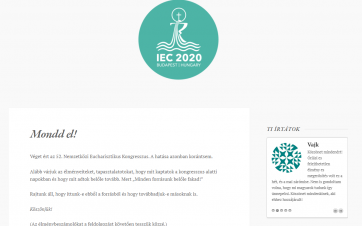
Everything is fine just the way it is

The idea of coming up with something different that could be a feasible program series even in a pandemic situation to replace the postponed Congress had popped up already in summer. Cardinal Péter Erdő invited the IEC guest speakers and witnesses by mail to send video messages about the influence the pandemic and the lockdown had brought into their and their communities’ lives, and to tell us what the Eucharist meant for them. That was the birth of the online pre-meeting, which was held right on the very same date the IEC original dates had been scheduled for.
For the last time all along the history of the Eucharistic Congresses since 1881, forced breaks had to be kept in the wake of the First and the Second World Wars only. In truth, this fact has just further motivated us to appear, in the online space at least, until the possibility of meeting in person. This unique event could be followed on the Congress’ YouTube channel. At the press conference that preceded the “The world has closed up, our hearts have opened up” online pre-meeting, Bishop Gábor Mohos, Head of the IEC Secretariat pointed out that some 90 thousands registration had arrived from more than hundred countries until spring. This fact has just become another strong, good reason not to let the Congress totally fading away this year.
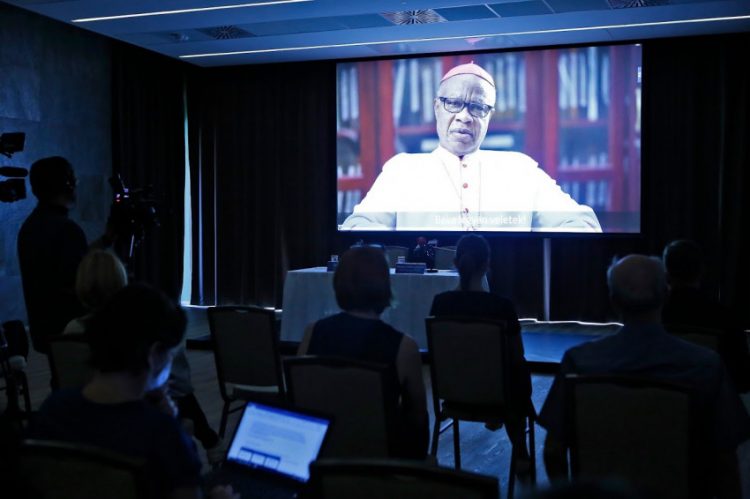
Between 13 and 20 September, the short videos that had arrived from 11 countries of five continents, including Rome, Nigeria, Quebec, New York and Sub-Carpathia, were uploaded one by one onto the Congress’ YouTube channel. We could have seen Péter Erdő in an absolutely new role, since these short videos had been preceded by the Cardinal’s very personal introductory speeches on the messengers, on top, the viewers were greeted by him not only in Hungarian but in Italian as well. The one week pre- meeting ended with the Cardinal’s closing remarks, sent from Heroes’ Square, the same square that had served as the venue of the Opening and Closing Mass of the 1938 International Eucharistic Congress.
The pre-meeting had seen a landslide victory. These video messages reached the farthest corners of the world, and arrived into as far a distance wherefrom we expected (and still have been expecting) guests for the IEC. It has been proven: the online space and the social media that has been criticised so much, can be perfectly used for many good. Indeed, we are able to get in contact virtually with the farthermost corners of the world, if the focus is on togetherness.

We have got greetings even from Pope Francis assuring us that he has been looking forward to the September 2021 meeting with great faith and joy. L’Osservatore Romano, the daily paper of the Holy See also expressed appreciation on the online pre-meeting, emphasizing that we, Hungarians had made out the best of this extremely difficult period.
Mons. Piero Marini, the President of the Pontifical Committee for International Eucharistic Congresses underlined in his interview given to the Vatican Radio that though he had already attended some Eucharistic Congresses, he had never ever experienced such a widespread interest and large number of registrations than in case of the Budapest Congress.
A further unprecedented super and extraordinary experience we had: the media teamwork. Just as the second wave of the pandemic hit us we have got immeasurable assistance from the local media so to spread the news about the postponed world event on as many channels as possible. We have increasingly had the feeling: if the aim that we are gathered for is good, the means to achieve it just come in by themselves.

We were hardly over the online pre-meeting, when we immediately launched our new talk show series in Radio Kossuth. The “Meet Jesus live” talk show started on September 27 with the aim to introduce the IEC speakers. These interviews were also preceded by Cardinal Erdő’s indispensable, illuminating opening speech. Four interviews were broadcasted in 2020: Jean-Luc Moens, the moderator of the Pope Francis’ established CHARIS shared his observations on talking about Jesus’ love around the slums of more than sixty countries; Valerian Okeke, Archbishop of the Onitsha Archdiocese, Nigeria gave information on the life circumstances and faith in his Diocese; Cardinal Gérald Lacroix, Archbishop of Quebec talked about his experiences of his Colombian mission; while Stanisław Gądecki, Archbishop of Poznan voiced his thoughts on the intensive brainwashing that was going on against the Church, which would demand a great courage from all of us to resist.
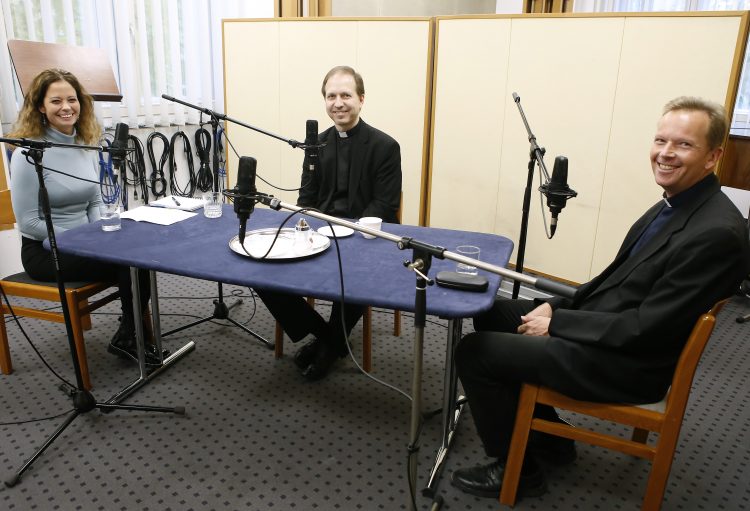
Since we have got the hang of taking advantage of the opportunities the media has provided, we’ve also tried ourselves in a relatively new territory, by moving on to podcasts publishing. We were not thinking in standard recordings, rather in exciting, lively, youthful and stirring broadcastings, specifically using the new generation’s language. The studio was provided by the Hungarian Catholic Radio, so the IEC podcast series could start in the second half of October. Though the guest list had been compiled for the podcasts till December, the second wave of the pandemic interfered again. But, by this time we were already experts in handling such a situation, so we did not stop, not even for a single moment: we rearranged the program schedule in no minute time and moved to having talks over the phone with the guests being unavailable in person. Such phone interview was recorded with Archbishop Gábor Mohos, who had just come through the coronavirus infection, and was also the guest of our very first podcast along with Kornél Fábry. Our talks were on the then recently beatified teenage boy, Carlo Acutis. There wouldn’t have been a more current topic, since it was Acutis, who took advantage of the online space for the best possible purpose, greatly impressing innumerable teenagers by his enormous faith. The fact that Archbishop Gábor Mohos has just recovered from COVID-19, whereby his entire life and faith has been revalued, gave an increased emphasis to our phone conversation. His message reached even the countries beyond our borders. Once again it has been proved: what a great power can be triggered by the confession of a person in a tough situation, and what an impact such a story may result via the online space.
We had talks, either in person or over the phone, on missions in Africa, volunteering, the power of common prayers, the interpretation of the miracle, the values of viticulture, the children’s evangelization, the long-ago Christmas memories, the faith of the ‘56 revolutionaries, and on the relationship between performing arts and Christianity.
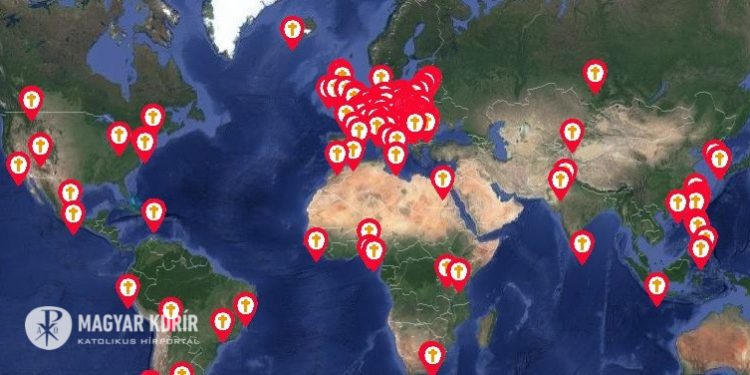
At the end of November, for the vigil of the Feast of Christ the King a Worldwide Adoration was called for. The initiative met way more participating believers than ever before. Common prayers were going on in 121 countries, in 6728 locations. People joined the praying from all over the world, including Pakistan, Togo, Panama, China, Kazakhstan, Benin, Iceland, Chile, New Zealand. The large number of participants reinforced us again that though we were unable to physically be together, instead a far stronger spiritual knit has been born.
During the busy times of the organization, we hardly ever noticed stepping into December, and the silence of Advent slipped unnoticed into our lives.
Cardinal Péter Erdő in his Advent video message emphasized the excellent opportunity this pandemic provided us to think over our life that has been nothing else but a bridge arching from the past to the future. It is just as important to build the bridge of love and knowledge, thereby creating our heritage for the future generation.
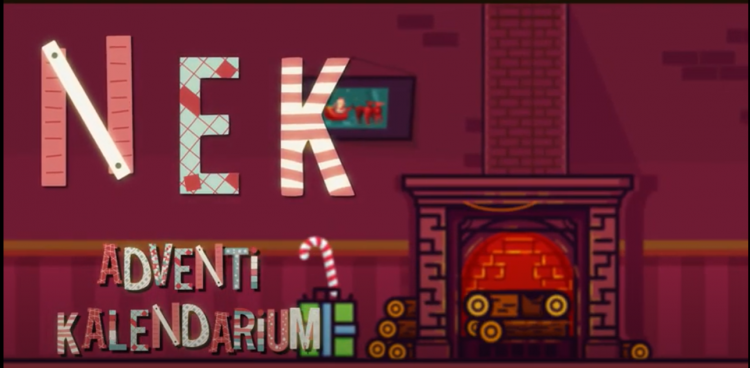
We wanted to make the remaining days to go until Christmas as memorable as possible, so we have launched an unusual Advent Calendar: actors, poets, writers and other well-known persons have sent their personal messages: they were singing, reciting poetry, reading out loud. 24 persons, 24 diverse approach to faith. These few moments of feasts meant real helping hands in this period full of anticipation and uncertainty.
On the 5 th December, with Cardinal Péter Erdő’s leadership we all were praying for the end of the pandemic. This unique event was brought in life upon the joint initiatives made by the Secretariat of the 52 nd International Eucharistic Congress, the Pázmány Péter Catholic University, the Editorial Offices of Magyar Kurír and Új ember, the messengers of the World Event, Csaba Böjte, András Csókay and Róbert Szikora as well by the missionary doctor, Réka Fodor. “So what is our duty here on Earth? It’s so evident: to love each other, to give a try to love and to help the way we can afford to do so. It is our eternal fate that depends on these.” – as could we hear Péter Erdő’s message from the Saint Michael’s Parish Church in Angyalföld.
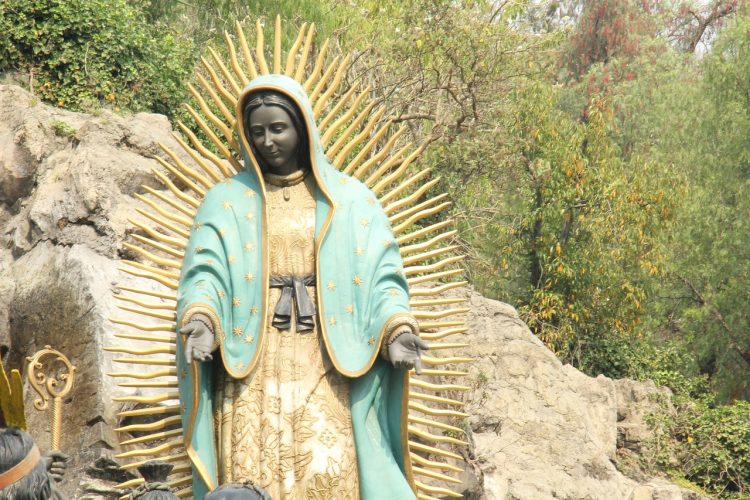
December 12 is one of the most significant feasts for the Catholics of Mexico: year by year, as many as 10 million people are on pilgrimage to the shrine of Our Lady of Guadalupe to attend one of the greatest liturgical events of the world. However, this year the doors of the pilgrimage site, the Basilica of Guadalupe remained closed. When we started the Congress organization, the success of the preparatory works had been devoted to the Blessed Virgin. Now again, Péter Erdő turned this difficult situation into good: In his video message, sent to the pilgrims of Mexico in Spanish, he thanked the intervention of the Heavenly Mother for the extra year we had received, thus enabling an even stronger spiritual preparation for the Congress.
The NEK TV New Year’s Eve special hosted foreign guests as well: Michael August Blume, Apostolic Nuncio to Hungary was talking about the greatest challenges of the Catholic Church; Father José Salas Castañeda, first secretary of the Apostolic Nunciature explained the extremely close relationship Mexican people have ever been with the Eucharist; while the Ambassador of Mexico to Hungary, David Nájera unveiled the Christmas traditions of his country.
As a last drive of the year, we got together in the Bonum TV studio, to summarize the year and to take stock of all of the lessons it taught us. This program is on the air on 1 st January 2021, at 9.10 a.m. on the Bonum TV channel. Time is quite a relative issue. Most likely we haven’t realized it as intensely as along this current year. There are times, when days, weeks, months are flying at rocket speed, while the other times the minutes were just crawling. 2020 was alike to this latter one. It was barely moving, it stepped at a snail’s space only, creating us new difficulties. After all, finally we got to the end of the year. This year totally turned our lives, relations and comfort zones upside down, on top: seriously tested our faith. But how well it did! It has been proved again: no matter what a big problem we face and how much we are forced onto our knees, we always stand up. Together, arm in arm, and if not otherwise but at least spiritually clinging to each other, we are able to find our feet even amidst the most difficult circumstances, amidst the deepest ups and downs. But above all, we have learnt another lesson: whatever happens, it is perfect the way it is. Even if it is difficult, or it doesn’t make sense, and painful, still it is fine that way. Let’s not forget that in 2021 either.
Wish you all a Blessed, Peaceful New Year!
Tünde Zsuffa, Head of Media and Communications Director
Photo: Marcsi Ambrus




